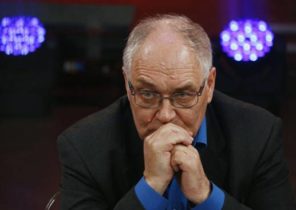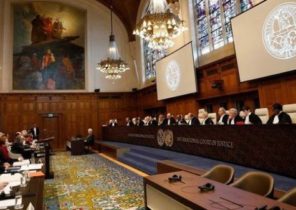Popular in all senses of the word philosopher, publicist, writer, teacher, and now editor in chief of noise has launched a quarterly publication that brings together the defenders of the sovereignty of all stripes. Simultaneously both left and right proudhonist, Michelle Onfre prefer de Gaulle to Mitterrand. In his political self-portrait he makes a mockery of labels and those who strive at any cost to hang them on him, recalls the love of France, not just French one idea or the camp, and France, Corneille and Robespierre, bossue and Sartre.
Le Figaro: You have created a magazine called “popular front”, which echoes one of the most significant events in the representation of the left. You always called yourself a man of leftist views. Who do you prefer? Marx? Proudhon? Jaures? Peg?
Michelle Onfre: the Name refers to two images. The first is the “popular front”, for example, images of Willie roney (Willy Ronis), which is simple and humble people with the joy of discovering nature, mountains, sea, beaches, dancing, camping and Cycling thanks to the social achievements of the popular front. Then, by the way, not spilling a drop of blood unlike other events in the history of the left, particularly from 1793.
The second point refers to another meaning of these concepts: need to create a genuinely popular front for confrontation with already existing anti-popular front, which unites left-wing right-wing and the right wing of the left. They share one of the Maastricht ideology of Europeanism, which has gone around the unification of the efforts of Emmanuel Macron. With me everything is simple: I’m a left proudhonist anti-Marxist views.
— Although you — the person on the left, you have readers and supporters among the right, even the right-wing. Who is closer to you in this camp: de Master, de Tocqueville, Aron?
— Proudhon… Because his socialism would come to the court among the right wing: he was a pragmatist, an empiricist, rejected ideology. Proudhon was for private property, free enterprise, personal initiative and responsibility, but at the same time for mutual benefit, cooperation, profit-sharing, self-government. He did not support the ideology of progress and religion: progressivism. He was a conservative in that you want to save, and revolutionary in that you can leave behind. Conservative no revolution and no revolutionary conservatism represent two sides of the barbarism. From Proudhon is both.
— How do you see the balance between de Gaulle and Mitterrand?
— There is no balance: I say Yes to de Gaulle, whose grandmother wrote a laudatory review about Prodone. His project of a referendum in response to the events of may 1968 were thwarted by the conservative right and rejected by opportunistic leftists. The initiative is largely inspired by the French socialism of the XIX century, which, by the way, spoke well de Gaulle.
The paradox of this couple is that de Gaulle was a leftist activist, who was supported right and Mitterrand — right activist that supported the left. My de Gaulle in common with Malraux and Gary, Simone veil and Kessel, the Us and Clavel. Mitterrand on the contrary can be put is that of the philosopher-putinista of Gittana…
Para de Gaulle-Mitterrand was one of the originators of formation and collapse of France of the twentieth century. Am I talking about this in the book “Parallel lives”, which is scheduled for the autumn.
— You call yourself a defender of sovereignty. Not too narrow this concept? The man who loves his country, a patriot, knows that sovereignty is not absolute and that the life of the nation implies dependence, alliances, external constraints, which have to put up…
— Of course, but please don’t stick to an ideological definition that give his enemies! Protection of sovereignty is not a national autism and an opportunity for the nation to return his spirit.
This is merely a preliminary condition, the desire to take up the helm of the straying vehicle. It says nothing about its future path.
The first anomaly mastrissa enemies of France that they were able to equate the word “sovereignty” to an insult. That is, its antonym is presented as a virtue. But the opposite of sovereignty is the vassalage, subjection, dependence, slavery, supervision! Personally, I do not perceive Kabbalah as a virtue…
The second anomaly is that they managed to convince people that the protection of the sovereignty equals nationalism, that is war! Note that the two world wars was the greater degree of Nations and empires. Imperialism is war. Imperialism is a Maastricht Europe, not France. Recently published on your pages interview of Bernard-Henri lévy Philippe de Villiers first said that Europe needs to adopt “alternative “Imperial” pole” (he put quotation marks here)…
The third anomaly is that they approved of the idea that Europe is a liberal Europe. Thus, if you are against liberal Europe, because it is liberal, then you are against Europe as such. Again, because they are repeated: according to their logic, if you’re a nation, then nationalism and thus for the war.
Protection of sovereignty is based on the Gaullist concept of Europe, Europe of Nations. Only unscrupulous demagogues can claim that this implies closure in its national circle of…
— Not inherent to the Champions of sovereignty to seek external causes “French trouble” as he called it Alain Peyrefitte? That is, to blame Brussels for certain things (bureaucracy, bloated social programs, tax pressure…), which were the handiwork of the us and the European Union?
The construction of this American Europe, which wanted the CIA, Monnet, Mitterrand, and then Maastricht, the Europeanists of the right and left wing is based on hatred of France. French the trouble is characterized by a greater degree of bureaucracy, administration and taxes, and hatred of ourselves, from which depends almost everything. This hatred promoted as a condition of love to Europe.
Love France, you need to end that pulls it down. To love her means to believe in the opportunity to return to her pride and dignity: a mixture of austere virtue of Corneille and Racine and stormy romanticism of Hugo and Delacroix, the harsh Christianity of Sampana and Delacroix and uncompromising Jacobinism of Robespierre and Bonaparte, lofty idealism of Sartre and bule and tragic pragmatism Camus and Aron.
— You speak very harshly about the media and politics, but continue to participate in them. Given that you devoted an entire essay Toro, do you have the desire to move away from the world, to continue the philosophical and literary work away from public disputes?
— I am harsh because I speak from experience… In 2010, when my book on Freud and psychoanalysis, has just appeared in the shops, all the “information sphere” as one man, have been hounding me. It was forbidden to get acquainted with all the works of Freud and to consider the 500 pages they raised the topic themselves that psychoanalysis is a “bleaching Negroes” in his own expression. This experience opened a door for me in the “engine room” of the system. Subsequently press repeatedly arranged campaign against me… I know her logic.
But was it necessary to be silent? I don’t think. The owners of the shops are very you would like. However, I consider it necessary to endlessly talk about how working machine for brainwashing, recruitment, brainwashing, the stupefaction, humiliation and contempt. That is, for production approval.
In addition, I continue to work in philosophy (a number of publications, including three volumes of 500 + pages, “concise encyclopedia of the world”), historiography (dozen books on the history of philosophy), poetry (a dozen collections), aesthetics (20 monographs devoted to living artists). The press sneers at it because he wants to equate me to the image that she created, although it absolutely doesn’t fit with who I really am. She is struggling with him…
Anyway, I do not exclude that one day I will decide to move away. But for now, let’s say that the desire of some politicians in Normandy and Paris to destroy the people’s University of Caen, in order to silence me, was a mistake: I only started talking even more! This was the impetus for the creation of a “popular front” with my friend Stephen Simon and our other projects…
— You want to become a teacher of the people, but not the dialectics of people-the elite is not wrong and destructive in itself? There is danger in the position that gives the nation all the virtues and blames the elite of all sins? Camus, which you so admire, have risen from a municipal school to the Nobel prize for literature, from “people” to “elite”…
I don’t think so… people are not the bearer of all virtues, but his spit for so many decades… Not all elites worthy of condemnation, but most of its representatives on the side of those who mock people.
I do not elevate to absolute any of these categories, and in the book of “yellow jackets” “the Greatness of little people” has repeatedly stressed that it does not agree with certain antics of these activists, but I approve of intellectuals who defended the “yellow jackets,” such as Emmanuel Todd and Jean-Claude Michea. While I have always stayed away from generalizations.
By the way, in the days of Camus poor child can climb up through the school. I can confirm this: I was born in 1959 and at that time it was still possible. Today, the rise of the little people into the world of the elite has become almost impossible.
— Rafael gluksman and françois-Xavier Bellamy moved from philosophy to politics. You have no such temptation? Are you ready to give him?
— Not at all. I believe that politics can be practiced otherwise without becoming a member of a political party.







